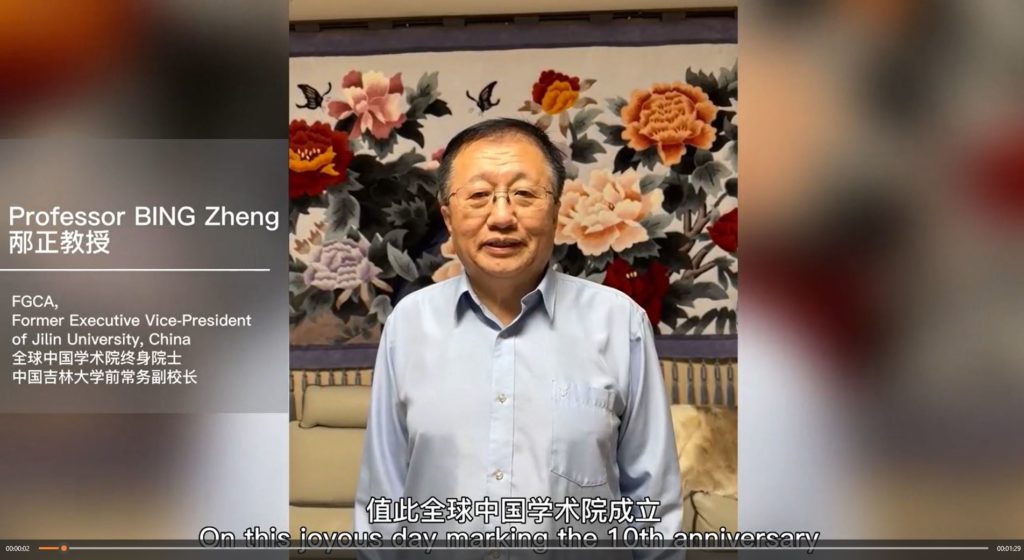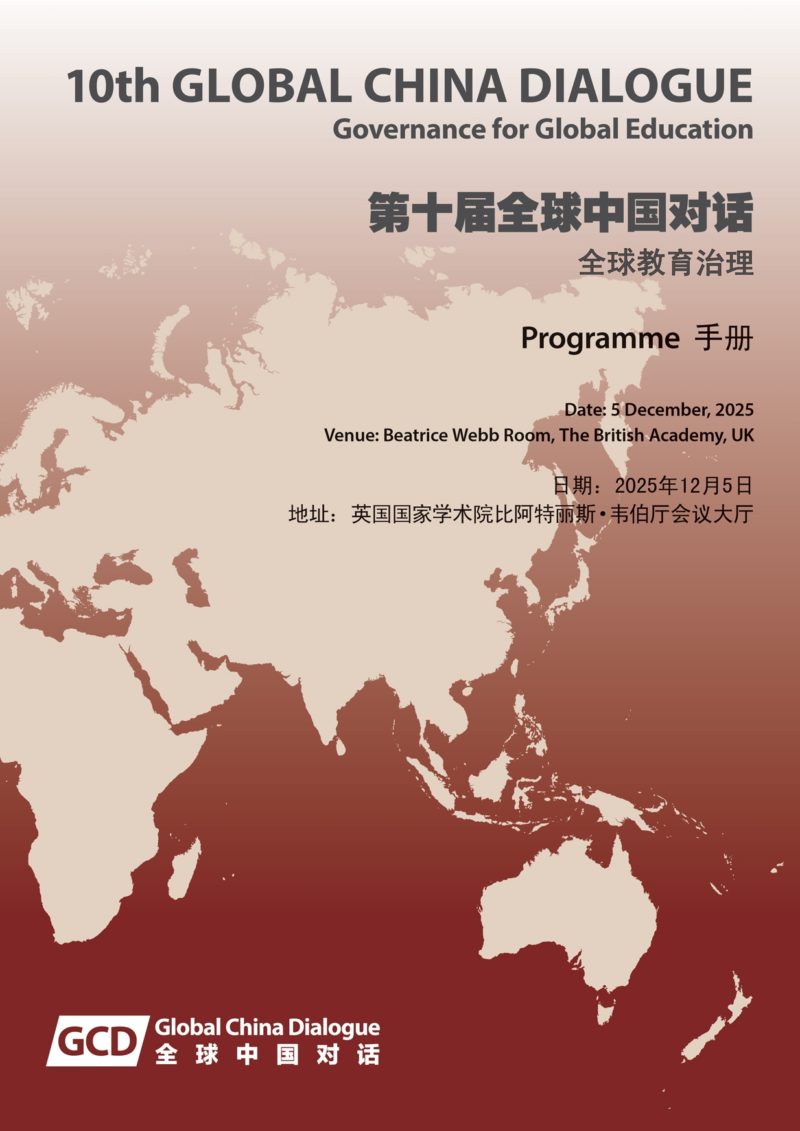
第十届全球中国对话——全球教育治理
第十届全球中国对话论坛会议通知
时间:2025年12月5日8:30-17:00 地点:英国国家学术院 (The British Academy)
继九届全球中国对话(Global China Dialogue, GCD)论坛的成功举办之后,第十届全球中国对话:“全球教育治理”将于2025年12月5日(星期五)在英国国家学术院(British Academy)举行。本届对话将聚焦如何通过政策协同、国际合作、公平保障、质量提升与制度创新,推动全球教育的可持续发展。
教育作为实现社会公正、促进全球共同繁荣、应对未来变革的重要基石,日益依赖跨国合作、多方参与与科技赋能。尤其是在人工智能、大数据等新兴技术深刻重塑教育模式与学习生态的背景下,全球教育治理正面临前所未有的机遇与挑战。
本届对话将搭建一个多元交流的平台,汇聚政策制定者、学者、教育工作者、企业代表和国际组织,共同探讨全球教育治理的新理念、新机制与新路径。
本届对话主办单位:
- 英国全球中国学术院
- 英国英国埃克塞特大学人文、艺术和社会科学学部
- 英国兰卡斯特大学ESRC语料库社科研究中心
- 中国北师香港浸会大学中华文化传播研究院
本届对话组委会
主席
- 托尼·麦肯勒里 Tony McEnery 教授,英国社科院院士及理事会理事,英国皇家艺术院院士;兰开斯特大学语言学和英语语言学系杰出教授;全球中国学术院理事会主席及创院院士
- 常向群教授,英国皇家艺术院院士;全球中国学术院院长及创院院士;伦敦大学学院荣誉教授(2015-20),中国南开大学特聘教授
- 李利教授,英国埃克塞特大学协理副校长(全球事务),人文、艺术与社会科学学部教授;中英人文高等教育联盟(UCHAHE)英方副秘书长
- 黄煜教授,北师香港浸会大学 (BNBU) 协理副校长,中华文化传播研究院常务副院长
秘书长
- 李伯一教授,南京财经大学工商管理学院教授;全球中国学术院中方理事会秘书及副院士
- 梁凯先生,全球中国学术院项目专员;英国 MEL Scholar 联合创始人;英国 MELScience 商务总监
本届对话包括以下四个版块:
- 治理模式创新与技术赋能:本板块探讨多方协作、公私合作(PPP)以及人工智能、大数据、在线教育和开放教育资源等技术在教育治理中的应用。终身学习与技能培训已成为应对未来挑战、提升教育韧性的关键。
- 教育公平、包容与质量保障:本板块聚焦教育权利保护、科研诚信与学术伦理建设,并通过国际评估、认证标准和教师培训提升教育质量。公平与质量始终是教育治理的核心目标,开放科学与透明评估体系为其提供有力支撑。
- 全球教育政策与国际合作:本板块涵盖全球性与区域性政策框架、国际组织在协调合作中的作用,以及通过大学联盟、学位互认和数字平台开展的跨国合作。当前教育政策日益依赖多层次、跨国界的协作机制,国际组织和全球网络共同促进教育资源的共享与互联。
- 教育融资与可持续发展:本板块关注全球教育融资机制、国际教育援助,以及教育与科技、产业的深度融合。充足与公平的资金支持是实现教育目标的保障,创新与跨界合作为包容性增长和共同繁荣注入强劲动力。
通过多元视角和跨界对话,第十届全球中国对话旨在为全球教育治理贡献中国智慧与国际经验,携手构建一个更加公平、优质、包容和可持续的全球教育生态。
第十届全球中国对话(GCD X)重要日期:
- 2025年8月31日:提交议题摘要的截止日期 https://globalchinaacademy.org/abstract-submission-form/
- 2025年11月8日:发言人提交发言稿和PPT的截止日期
- 2025年11月11日:注册的最终截止日期
- 2025年11月25日:会议手册提供下载(英文版、中文版及双语版)
- 2025年12月5日:第十届全球中国对话举行日期
- GCD X 的会议文集将于 2026年 出版,内容包括会议实录、中英文翻译及编辑整理。
我们诚邀来自不同学科、领域和地区的投稿,深入探讨技术与社会转型时代全球教育治理所面临的挑战与机遇。
同时,我们也欢迎机构单位根据我们的《合作单位指南》参与本次对话,担任联合主办、协办、支持或赞助单位。
- 联系人:梁凯
- 邮箱:dialogue@gca-uk.org 或 info@globalchinaacademy.org
请点击以下链接进行相关操作:
10th GCD (GCD10) – Governance for Global Education
Call for Papers
Following nine successful Global China Dialogue (GCD) Forums, the 10th GCD (GCD10) – ‘Governance for Global Education’ – will be held at the British Academy on Friday, 5 December 2025.
GCD10 will focus on how to promote sustainable development in education worldwide through policy coordination, international cooperation, equity assurance, quality improvement, and institutional innovation. As a vital foundation for achieving social justice, fostering global prosperity, and addressing future transformations, education increasingly relies on cross-border collaboration, multi-stakeholder engagement, and technological empowerment.
In particular, with the profound impact of emerging technologies such as Artificial Intelligence (AI) and big data reshaping educational models and learning ecosystems, global education governance faces both unprecedented opportunities and challenges. This Dialogue will provide a platform for diverse conversations, bringing together policymakers, scholars, educators, business leaders, and representatives from international organizations to explore new ideas, mechanisms, and pathways for global education governance.
Organizers
- Global China Academy, UK
- Faculty of Humanities, Arts, and Social Sciences, University of Exeter, UK
- ESRC Centre for Corpus Approaches to Social Science, Lancaster University, UK
- TBC, China
Organizing committee
Chairs
- Professor Tony McEnery FAcSS FRSA, Distinguished Professor of English Language and Linguistics at Lancaster University; Council Member of Academy of Social Sciences; Chair of Global China Academy Council and Founding Fellow
- Professor Xiangqun Chang FRSA, President of Global China Academy and Founding Fellow; Honorary Professor of University College London (2015-20); Distinguished Professor of Nankai University of China
- Professor Li Li is Associate Pro-Vice-Chancellor for Global Engagement in the Faculty of Humanities, Arts, and Social Sciences (HASS), University of Exeter, UK
- TBC, China
General Secretaries
- Professor LI Boyi, Secretary and Event Officer of Chinese Council at Global China Academy, UK; School of Business Administration, Nanjing University of Finance and Economics, China
- Mr Kai Liang, Event Officer, Global China Academy, UK; Director of Business Development of MEL Science; Event Officer, Global China Academy, UK
GCD X includes the following four panels
- Panel 1: Global Education Policy and International Cooperation: this section covers global and regional policy frameworks, the coordination roles of international organizations, and cross-border cooperation through university alliances, degree recognition, and digital platforms. Education policy today relies on multi-level collaboration beyond national boundaries, with international organizations and global networks promoting the sharing of educational resources.
- Panel 2: Educational Equity, Inclusion, and Quality Assurance: this section focuses on protecting educational rights, promoting research integrity and academic ethics, and improving quality through global assessments, certification, and teacher training. Equity and quality remain central to education governance, supported by open science and transparent evaluation systems.
- Panel 3: Governance Innovation and Technological Empowerment: This section explores multi-stakeholder collaboration, public-private partnerships, and the use of AI, big data, online education, and open resources to reshape educational models. Lifelong learning and skills development are vital to meeting future challenges.
- Panel 4: Education Financing and Sustainable Development: this section highlights global financing mechanisms, international aid, and the integration of education with technology and industry. Fair and sufficient funding supports education goals, while innovation and cross-sector collaboration drive inclusive growth and shared prosperity.
Through diverse perspectives and cross-sector dialogue, the 10th Global China Dialogue aims to contribute both Chinese insights and international experience to global education governance, working together to build a fairer, higher-quality, more inclusive, and sustainable global education ecosystem.
Important Dates for GCD X
- 31st July 2024: Deadline for submitting abstracts for proposed topics. https://globalchinaacademy.org/abstract-submission-form/
- 1st November 2024: Deadline for interested parties to submit an abstract.
- 8th November 2024: Deadline for speakers to submit their notes and PowerPoint presentations.
- 11th November 2024: Final deadline for registration.
- 25th November 2024: Programme available for download in English, Chinese, and dual-language formats.
- 29th November 2024: Date of the 9th Global China Dialogue.
The proceedings of GCD IX will be published in 2025, featuring transcribed records, bilingual translation, and editing. This landmark event promises to be a pivotal platform for discussing the future of AI in global governance and its broader societal implications.
We also welcome institutional partners to join this Dialogue as co-organisers, associate co-organisers, supporters, or sponsors, in accordance with our Guidelines for Partner Institutions.
Contac: Kai Liang
Emails:dialogue@gca-uk.org or info@globalchinaacademy.org
More info
- Submit your abstract
- Call for Papers (Chinese)
- GCD9 basic info
- GCD9 basic info (Chinese)
- GCD9 Registration
- GCD9 Homepage
- GCD9 Homepage (Chinese)
- GCD series Homepage
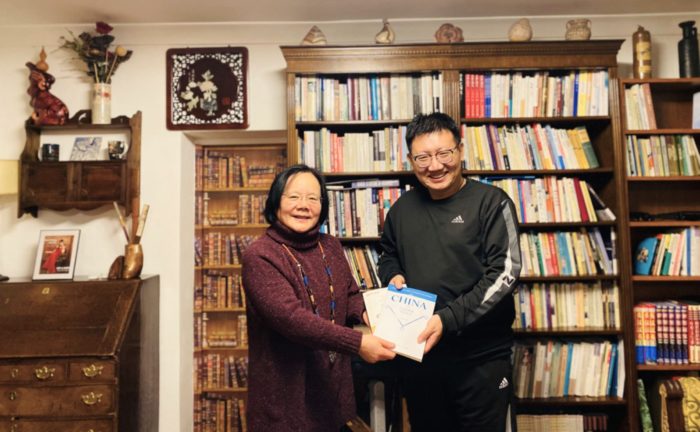
Professor Zhao Kejin visits GCA with the last wish of LI Qiang, former Chinese chairman of the Global China Academy Council (20 Jan. 2024)
On January 5, 2024, Professor ZHAO Kejin, Deputy Dean of the School of Social Sciences at Tsinghua University, contacted me to inform me that he would be visiting the UK in two weeks, with a meeting scheduled for January 20. Coincidentally, Professor FANG Lili, Distinguished Chief Professor at Southeast University, planned to bring a few copies of her book, Fei Xiaotong’s Inquiry: How Human Society Can Achieve ‘Beauty in Diversity and Shared Harmony’ (《费孝通之问:人类社会如何走向“美美与共”》Beijing: Commercial Press, 2021), to the UK as a gift for me and the academy.
Professor Fang was the last postdoctoral researcher supervised by the renowned Chinese anthropologist and sociologist Fei Xiaotong (1910-2005) at Peking University. During our visit to the United States in 2019, she summarized her understanding of Fei Xiaotong’s thoughts to me: In his early years, Fei was primarily concerned with ecological issues (the relationship between people and the land) and how China could achieve modernization. In his later years, he focused more on the issue of ‘mentality’ (人心, the relationship between people), considering how mutual understanding between individuals, as well as harmony between ethnic groups and nations, could lead to a world beyond the divisions of civilization and barbarism, or East and West, toward achieving ‘beauty in diversity and shared harmony’ in human society. [Note 1]
The above contact occurred just three weeks after Professor LI Qiang (1950-2023) passed away. LI Qiang served as Dean of the School of Social Sciences and Humanities at Tsinghua University and was the Founding Dean of the School of Social Sciences (two terms). He was also the Honorary Chinese President of the Global China Institute and the Chinese Chair of the Global China Academy Council. Recommended by Professor LI Qiang, Professor ZHAO Kejin traveled to London to participate in the 6th Global China Dialogue: Governance for World Peace at the British Academy and participated online in the 7th Global China Dialogue: Reforming Global Governance in 2021. Professor ZHAO Kejin’s visit in summer holds significant meaning for the academy, symbolizing a continuation and development of past efforts.

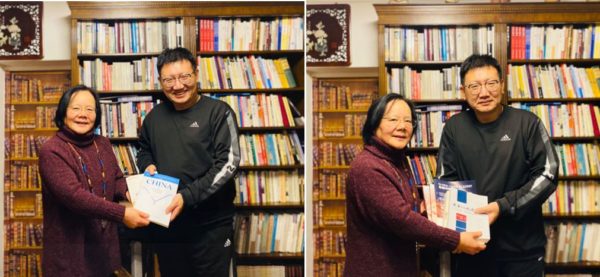
During his visit to the UK, Professor Zhao brought FANG Lili’s book on Fei Xiaotong’s thoughts, along with his own book China & Global Peace (Gale Asia, 2020) and other titles. I, in turn, presented ZHAO Kejin with my book Guanxi or Li shang wanglai?: Reciprocity, Social Support Networks, and Social Creativity in a Chinese Village (Chinese edition, Liaoning People’s Publishing House, 2009), as well as the Global China Academy leaflets and the brochure for the 7th Global China Dialogue.
Later, Zhao Kejin told me that Professor LI Qiang had left a will asking them to maintain the relationship with the Global China Academy (GCA). From ZHAO Kejin’s different expressions in the above photos, it might suggest that we discussed a serious topic. ZHAO Kejin proposed visiting the UK in the summer and mentioned that he might bring a delegation from Tsinghua University, possibly with delegations from other universities in China. For the Global China Academy, which serves as a platform to promote academic exchange between China and the world, this would undoubtedly be a great opportunity.


For dinner, I prepared a Western-style meal for Professor ZHAO Kejin and his PhD student ZHAO Danyang [Note 2].
- Starter: The pumpkin soup is a French-style dish, mainly enjoyed during the autumn and winter seasons. Although this soup appears simple, nutritious, and delicious, it was not easy for someone like me, who is not skilled in cooking, to make. First, the pumpkin needs to be peeled, deseeded, and cut into small pieces. These are then sautéed with onions, garlic, and other ingredients before adding broth and seasoning, and cooking until soft. After cooking, the soup is strained, and cream is added for a smoother texture. The soup is garnished with a dollop of yogurt and mint leaves, whose fresh flavor adds a refreshing touch to the rich pumpkin soup, enhancing its layers of taste.
- Main Course (Large Plate): Cheeseburger Loaded Fries. This dish is typical of American fast food, combining classic burger elements such as beef mince, cheese, tomatoes, onions, and burger sauce, which are layered over fries (instead of being placed between two buns), creating a dish that is rich, flavourful, and low in carbohydrates.
- Main Course (Medium Plate): Creamy Double Mushroom Penne is a classic Italian pasta dish. The combination of creamy sauce and two different types of mushrooms provide a rich taste and flavour, with the addition of cheese further enhancing the aroma and texture of the dish. However, to reduce carbohydrate intake, this dish was served not with penne but with a Mediterranean-style salad.
- Dessert: Fruit platter + snacks (details omitted).
Professor Zhao and Danyang appreciated the meal (photos provided by ZHAO Danyang). Our ‘International Cuisine’ concept and its practice, as reflected in this dinner experience, can be seen as an embodiment of Fei Xiaotong’s concept of ‘beauty in each culture appreciating the beauty of others’ (learning to appreciate different lifestyles and traditions) in everyday life, with the hope of achieving an understanding of ‘shared beauty in harmony’.
Note:
- Without a doubt, Fang Lili’s summary contributes to the understanding of Fei Xiaotong’s thoughts. However, from the corpus of The Complete Works of Fei Xiaotong, it can be observed that the term ‘ecology’ is mentioned a total of 304 times, all of which appear after Volume 8 (1957); the term ‘cultural ecology’ is mentioned 61 times, mainly between Volumes 10 and 15 (1983-1996). The term ‘human mind’ (人心) is mentioned 43 times, appearing in various volumes after Volume 3 (1942); ’mentality‘ (心态) is mentioned 113 times, in Volumes 14-17 (1992-2004). The term ‘people-to-people’ is mentioned 116 times, with references in every volume starting from the first, with as many as 23 mentions in Volume 16 (1997-1999). The term ‘nation-to-nation’ is mentioned 9 times, appearing in Volumes 8-9 and 13-17, while ‘country-to-country’ is mentioned 6 times, in Volumes 13, 16, and 17. Volumes 16-17 collect Fei Xiaotong’s works from 1996 until his death. If we consider Fei Xiaotong’s later years starting from 1996 (at age 86), we can say that he expanded his reflections on ‘people-to-people’ relationships to include ‘nation-to-nation’ and ‘country-to-country’ relationships. However, to fully understand the connections between these terms and ‘cultural ecology’ and ‘mentality,’ much more research is needed.
- I previously used Gousto, a UK-based meal kit with environmentally friendly packaging that allows you to easily enjoy fresh and delicious meals at home with convenience and flexibility. This time, I tried Hello Fresh, a meal kit that operates in multiple countries, including the US, UK, Germany, and Australia, and offers fresh ingredients in a simple and quick way. However, after using it for a while, I decided to stop because I am more suited to low-carb dishes.
Xiangqun Chang, 30 January 2024
- Click here to view the Chinese version of the blog.
- Click here to view the page ‘GCA Life Fellow Korean Sociologist Professor HAN Sang-Jin Meeting Professor Xiangqun Chang at Seoul, January 2023.’
- Click here to the news ‘The Chinese Chair of the Global China Aacademy Council, Professor LI Qiang, passed away on the 12 December, 2023’.
- Click here to watch a video of Professor LI Qiang’s greeting for the launch of the Global China Academy as an academy at the 7th Global China Dialogue, on December 10th, 2021, at the British Academy.
- Click here to visit the GCA news & blog section.

带着全球中国学术院理事会前中方主席李强的遗愿,赵可金教授访问全球中国学术院 (2024年1月20日)
2024年1月5日,清华大学社会科学学院副院长赵可金教授联系了我,告知他将在两周后访问英国,并定于1月20日进行会面。正巧,东南大学杰出首席教授方李莉打算把她的著作《费孝通之问:人类社会如何走向“美美与共”》,(方李莉著,北京:商务印书馆,2021年)带到英国送给我和学术院。
方教授是著名中国人类学家和社会学家费孝通(1910-2005)在北京大学指导的最后一位博士后研究员。在我们2019年访问美国时,她向我概括了她对费孝通思想的理解:早年主要关心生态问题(即人与土地的关系)以及中国如何实现现代化问题,晚年更加注重“心态”问题(即人与人的关系),从人与人之间的相互理解,到民族与民族、国家与国家之间的和谐相处,超越导致世界文明矛盾的文野或东西之分来思考人类社会如何走向美美与共。她的这本书展示了费孝通晚年的这些思想。【注释1】
上述联系发生在李强教授(1950-2023)去世仅三周后。李强曾担任清华大学社会科学与人文学院院长,并且是社会科学学院的创始院长(两届)。他还曾任全球中国研究院名誉中方院长以及全球中国学术院理事会中方主席。在李强教授的推荐下,赵可金教授曾前往伦敦,参与了在英国学术院举行的第六届全球中国对话:世界和平治理,并于2021年在线参加了第七届全球中国对话:全球治理改革。对学术院来说,赵可金暑假期间的来访具有继往开来的重要意义。


在访问英国期间,赵可金带来了方李莉关于费孝通思想的书,以及他自己的著作《China & Global Peace》(Gale Asia, 2020)和其他书籍。我也回赠了赵可金我的著作《关系还是礼尚往来?:中国乡村的互惠、人际网络与社会创造力》(中文版,辽宁人民出版社,2009),以及全球中国学术院的宣传册和第七届全球中国对话的手册。
随后,赵可金告诉我,李强教授曾在遗嘱中嘱托他们要维持与全球中国学术院的关系。从上述照片中赵可金的不同表情来看,可能暗示我们讨论了一个严肃的话题。赵可金提议在夏天访问英国,并提到他可能会带领清华大学的代表团前来,或许还会有来自中国其他大学的代表团同行。对于全球中国学术院这一促进中国与世界学术交流的平台来说,这无疑是一个很好的机会。


晚饭,我为赵可金教授和他的博士生赵丹阳准备的是西餐【注释2】。
- 头盘:南瓜汤属于法式汤品,主要在秋冬季食用,这一看似简单、营养和美味的汤品,对我这样不通厨艺的人来说,做起来并不容易。首先将南瓜削皮去瓤切成小块,与洋葱、蒜等配料一起炒香,随后加入高汤和其他调料煮至变软。煮好后过滤,并加入奶油调味,使汤质地更加丝滑。表面点缀了酸奶,并装饰了薄荷叶,其清新的味道为浓郁的南瓜汤带来一丝清爽感,增添了层次感。
- 正餐大盘:汉堡芝士薯条(Cheeseburger Loaded Fries)。这道菜属于典型的美国快餐风格,结合了经典汉堡的元素,如牛肉末、芝士、番茄、洋葱和汉堡酱,并将这些配料堆叠在薯条上(而非夹在两片圆面包中),形成了一道丰富、浓郁且低碳水化合物的菜品。
- 正餐中盘:奶油双蘑菇通心粉(Creamy Double Mushroom Penne)属于意大利经典意面料理。奶油酱和两种不同的蘑菇的搭配带来了浓郁的口感和丰富的风味,奶酪的加入进一步提升了菜品的香味和质感。然而,为了减少碳水化合物的摄入,这道菜没有与通心粉搭配,而是配上了地中海式沙拉。
- 甜食:果盘+小吃(略)
赵老师和丹阳对此表示欣赏(照片由赵丹阳提供)。我们的“食国际餐”理念及其实践,通过这次晚餐的经历,可以被视为费孝通“各美其美,美人之美”理念在日常生活中的体现(学习欣赏不同的生活方式和传统),希望能够达到“美美与共”的理解。
注释:
- 方李莉的这一概括无疑有助于理解费孝通的思想。然而,从《费孝通全集》的语料库中可以看到,“生态”一词共提及304次,均出现在第8卷(1957年)之后;其中“人文生态”提及61次,主要集中在第10-15卷(1983-1996年)之间。“人心”一词提及43次,从第3卷(1942年)起各卷都有提及;“心态”提及113次,出现在第14-17卷(1992-2004年)。“人与人”提及116次,从第一卷开始每卷都有提及,尤其是在第16卷(1997-1999年)中有23次之多。“民族与民族”一词共提及9次,分布在第8-9卷和第13-17卷中,“国家与国家”提及6次,出现在第13卷和第16-17卷中。第16-17卷收录的是费孝通从1996年到去世前的著作。如果将费孝通的晚年从1996年(86岁)开始计算,可以说他将“人与人”的思考拓展到了“民族与民族”和“国家与国家”的思考。然而,要真正理解它们与“人文生态”和“心态”之间的关系,还需要进行大量的研究。
- 我以前用过Gousto,这是一种英国本土的食材包,方便而灵活,环保包装,让人在家中轻松享受新鲜美味的餐食。这次我尝试了Hello Fresh,这种在美国、英国、德国、澳大利亚等多个国家运营的简单快捷的新鲜食材包。不过,使用了一段时间后,我还是放弃了它们,因为我更适合低碳水化合物的菜品。
常向群,2024年1月30日
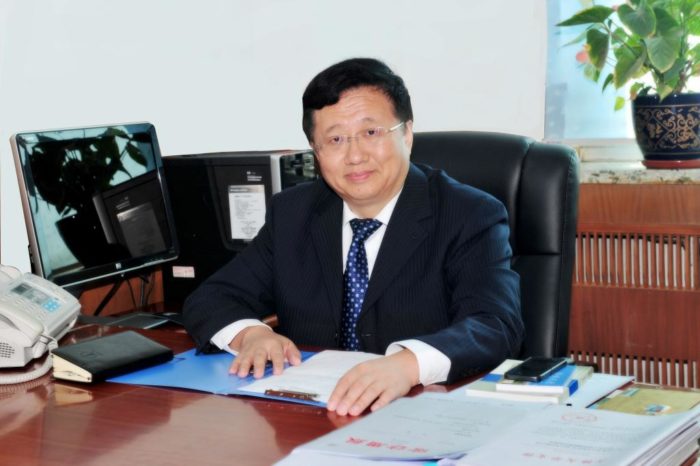
Professor BING Zheng Appointed as Chinese Chair of the Global China Academy Council
Professor BING Zheng has been appointed as the Chinese Chair of the Global China Academy Council by the GCA Board of Trustees on 12 January 2024.
Professor BING Zheng 邴正教授 FGCA, Former Executive Vice-President of Jilin University. Currently, Deputy Director of the Administrative Committee of Jilin University, Director of the Northeast Revitalization Development Research Institute of Jilin University, Professor of the School of Philosophy and Sociology at Jilin University. He has served as President of the Jilin Provincial Academy of Social Sciences, Chair of Jilin Provincial Social Science Federation, Vice Chairman, President of the Jilin Daily newspaper. He is a standing member of the Provincial Political Consultative Conference. He also holds positions as the President of the East Asian Sociological Association (Chinese side), Deputy Director of the Academic Committee of the Chinese Sociological Association, Executive Director of the Chinese Dialectical Materialism Research Association, and President of the Jilin Provincial Sociological Association. He is an expert reviewer for the National Social Science Fund Review Committee, a cross-century talent of the Ministry of Education, a decision-making advisory expert for the Jilin Provincial Committee and Provincial Government, and a senior expert in Jilin Province. He has long been engaged in the teaching and research of philosophy and sociology, with his professional direction being cultural philosophy, developmental sociology, and cultural sociology. He is author of 11 academic books, co-authored, contributed to, and edited more than 30 books, and published over 200 journal articles in major academic journals such as Chinese Social Sciences of China and Philosophical Research.
In 2015, at the 2nd Global China Dialogue on transculturality and new global governance, Professor Bing Zheng delivered keynote speech focusing on cultural communication and regional cooperation amidst globalization. He emphasizes the importance of cultural communication in the globalized world, highlighting the challenges and contradictions it faces, such as the tension between globalism and nationalism, idealism and utilitarianism, and masterism and massism. He discusses how globalization affects cultural exchanges, the role of English and Western culture in shaping global culture, and the impact of technological and economic disparities between developed and developing countries. Zheng calls for a resolution to these cultural contradictions, suggesting it as a historic mission for contemporary intellectuals.
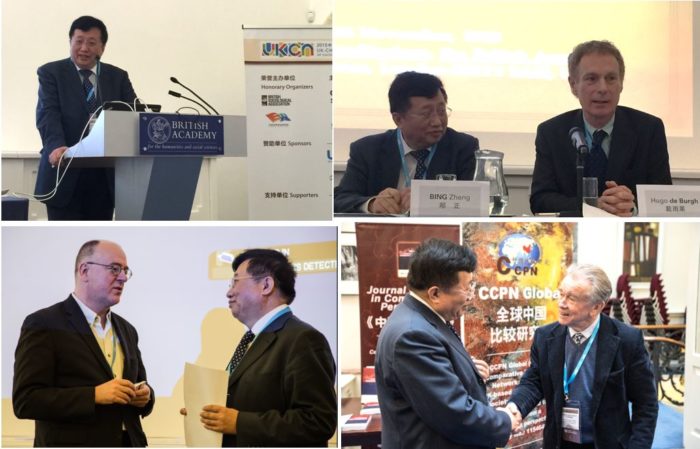
Professor BING Zheng delivered a keynote speech (top left); Professor Hugo de Burgh chaired it (top right); Professor Kerry Brown was another keynote speaker, paired with Professor Bing (bottom left); Professor Martin Albrow met Professor Bing (bottom right).

Professor Bing with some speakers and participants at GCD II (front, the left).
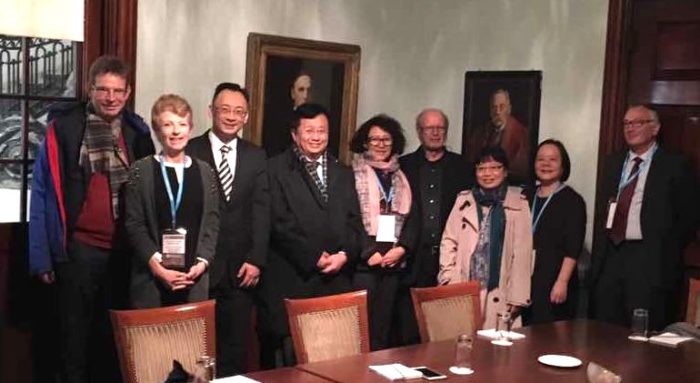
Click here for the Report on the second Global China Dialogue
Professor Bing (4th from the left) also attended a meeting with some organizers of GCD II, including Professor Stephan Feuchtwang (LSE, 4th from the right), Professor Xiangqun Chang (2nd from the right), Ingrid Cranfield (2nd from the left), and Charles Grant (1st from the left).
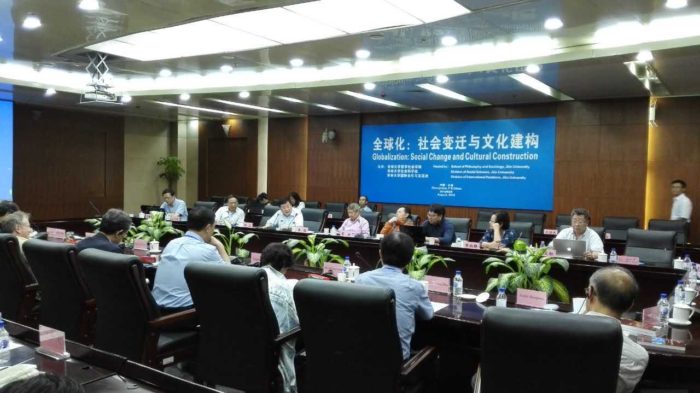
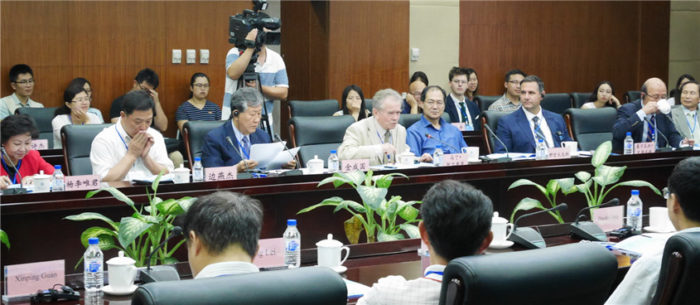
Professor Bing Zheng (3rd from the left in the top photo) organized the international conference ‘Globalization: Social Change and Cultural Construction’ on August 12, 2016, at Jilin University. The conference attracted over 60 experts and scholars from various countries and regions to discuss topics related to globalization, including social development, cross-cultural research, and cultural exchange. Professor Martin Albrow (in the middle in the bottom photo), Honorary President of CCPN Global, and Professor Xiangqun Chang (2nd from the right in the top photo), President of CCPN Global, made speeches at the conference.
‘I am Professor Bing Zheng, and my research field is cultural sociology and cultural philosophy. I am very happy to be an academician of the British Global Chinese Academy. I have visited the United Kingdom and exchanged views with British scholars on issues related to global social development and cultural development. I have a long-term academic exchange friendly relationship with the famous British Professor Albrow-Martin. I am very willing to work hard to promote academic exchanges and cooperation between scholars from China and the United Kingdom, and I wish the UK Global China Academy will do better and better.’ — Video message for the 7th Global China Dialogue and the Academy Funding Dinner on December 10, 2021, at the British Academy.
‘On this joyful occasion of the 10th anniversary of the Global China Academy, I extend my heartfelt thanks and sincere congratulations to the Global China Academy and Professor Chang Xiangqun. Since its inception, the Academy has been a dynamic force in organizing scholars from China and the UK, enhancing academic and cultural exchanges, and fostering academic discussions and publishing activities. It has significantly contributed to connecting scholars and deepening Sino-British understanding and friendships through exchanges and visits. I wholeheartedly wish the Academy continued success in attracting talent, strengthening academic collaboration, and furthering Sino-British friendship and research on globalization, leading to more scholarly achievements.’
Click the picture above to play the video message for the 8th Global China Dialogue and the celebration dinner for the 10th anniversary of the GCA since its establishment in 2013 as CCPN Global, on December 8, 2023, at the House of Lords, the UK Parliament.

